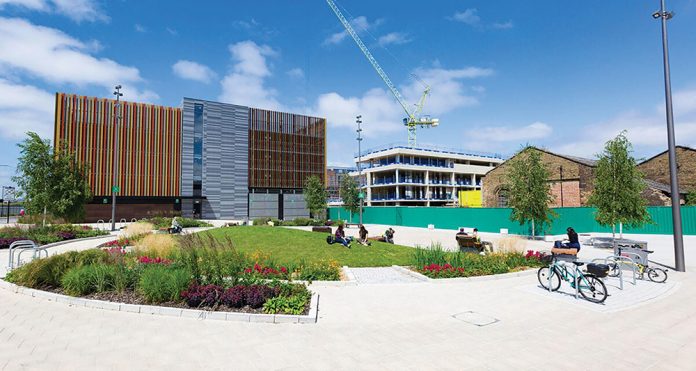The concept of a circular economy is not new – in fact, the linear economy characterised by taking, make and dispose of has only existed since the industrial revolution in any particularly meaningful way. In previous eras, very little was thrown away, as nearly everything had an alternative use at the end of its life, even if only for compost. Building materials are a case in point; many old buildings are constructed from stone from demolished buildings, and some old timbered properties are held up by old ships timbers.
So why don’t we still do this everywhere? The truth is that it’s far more convenient and sometimes cheaper to manufacture products from virgin material, and nearly always the quality is more consistent.
GreenBlue Urban has always been committed to the circular economy principle – and it is far wider than just product manufacture. A circular economy is a wide economic system that works to challenge global issues such as waste and pollution, but also climate change, biodiversity loss and pollution – both air and water. In setting such massive goals, the circular economy needs a huge shift in thinking, by all of us.
In addition to the issues that the circular economy seeks to tackle, as above, it is designed to benefit not only the environment but to bring prosperity to business and to society. It is regenerative by design, meaning that natural resources do not become so quickly depleted, and therefore new industries came to arise, bringing healthy economic growth.
Planting trees is a perfect example of a circular economy, as the tree provides multiple benefits during its life, and can be used to manufacture products when it is cut down. Removal of a plantation tree results in space left for new tree planting, bringing employment to often rural areas. But what about urban trees?
Urban trees also form part of a circular economy – but to maximise the benefits, these need to be properly planted, and grow to maturity. This is the raison d’être of GreenBlue Urban – assisting trees in their struggle to survive in a hostile environment. Whether it is providing soil support by using RootSpace soil cells, guiding tree roots with products from the ReRoot root management range, bringing air and water to the rooting zone with RootRain irrigation and aeration solutions or physically protecting the tree from above ground damage with tree grilles and guards.
The GreenBlue Urban innovative solutions enable trees to grow to their species potential longevity. All the below-ground products are manufactured from 100% recycled materials and are recyclable up to 5 times once they have finished their life. This is central to the GreenBlue Urban philosophy, as our vision is to bring environmental benefits to communities around the world, and the least possible carbon footprint.
With policy insisting that all developments of more than 150 residential units, buildings over 30m in height or commercial premises over 2500m2, a Circular Economy Statement must be submitted, along with a Whole Life Carbon Assessment as part of the planning process. This aims to reduce waste and pollution, and in time, will help achieve the net-zero carbon commitments. It is suggested that circular economy strategies could deliver emissions reductions that could limit the expected temperature rise by half – an incredible benefit.
Greenblue Urban is the global leading solutions provider in assisting trees in their battle to establish in urban spaces. Established in 1992 with more than 40 years’ experience in the landscaping industry GreenBlue provide exceptional expertise & Solutions in planning, design and the installation of green and blue infrastructure in the hard landscape.



